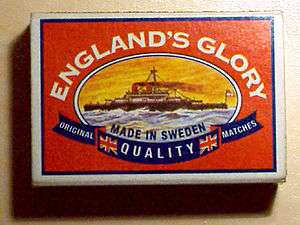England's Glory

England's Glory is a brand of matches, available in the United Kingdom, using an iconic image of a Victorian battleship, HMS Devastation.
History
The product was originally made in Gloucester by S.J. Moreland and Sons, who became a subsidiary of Bryant and May in 1913, although full ownership by Bryant and May only came in 1938.[1]
Consolidation of match production within Great Britain led to Bryant and May's matches being made at Garston in Liverpool, London and Glasgow. England's Glory then became a Brand Name for matches made at Bryant and May's Garston factory which were sold mainly in the North of England and the Midlands.[1] The matches made in Glasgow were marketed in Scotland as Scottish Bluebell matches.[1]
Bryant and May themselves ceased to exist in the 1980s, but England's Glory and Scottish Bluebell branded matches are still manufactured in Sweden by the company Swedish Match.
Popular culture
The public house "England's Glory" in London Road, Gloucester is named for the matches.
The song "Senses Working Overtime" by XTC contains the spoken phrases "England's Glory" and "A striking beauty", the latter being a slogan associated with "England's Glory" matches.
The Macc Lads wrote a song called "England's Glory" referring to the matches.
The Welsh band Stereophonics took the lyric 'It only takes one tree to make a thousand matches but only takes one match to burn a thousand trees' for their hit song A Thousand Trees from the back of a box of England's Glory matches.[2]
Various re-issues of English pub-rock performer Ian Dury's 1977 album "New Boots and Panties" contain a live version of his composition "England's Glory".
In an early episode of Jeeves and Wooster, set in the 1920s, a choir boy brings a bug out of a box of England's Glory matches. This is in order to put the insect on another choir boy, causing him to cry out during the Church Service, and thus get dismissed from the choir, and therefore unable to compete in the Fete's races, much to Wooster's chagrin. The boy was a fast runner, and Wooster and his chums were planning on betting on him. [3]
References
- 1 2 3 Beaver, Patrick (1985). The Match Makers: The Story of Bryant & May. London: Henry Melland Limited. ISBN 0-907929-11-7.
- ↑ contactmusic.com
- ↑ http://www.imdb.com/title/tt0614732/?ref_=ttep_ep3